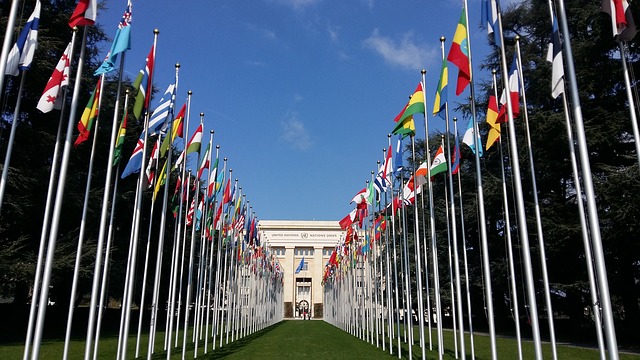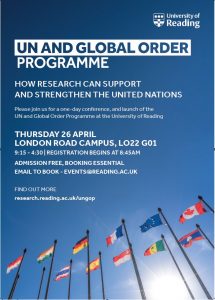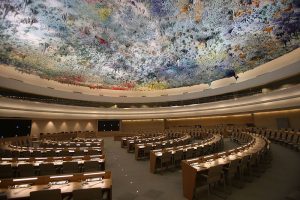Reading’s Professor Rosa Freedman and Professor Aoife O’Donoghue of Durham University consider the legacy of the late former UN Secretary-General in a new post for The Conversation.

The passing of Kofi Annan, former United Nations Secretary-General and Nobel Peace Prize laureate, has been met with tributes from all around the world. His home country, Ghana, declared a week of national mourning.
Annan rose through the ranks of the UN to become the first black African to head the organisation, and his many achievements are rightly being celebrated. Under his tenure, human rights and development were put at the forefront of all UN work, ensuring that the organisation focused on all people in all parts of our global society. Courageously, he was also the first UN Secretary-General to recognise and condemn the UN’s disproportionate focus on Israel as a human rights violator compared to many other similar or worse offenders.
It is also right to remember that on his watch, the UN’s reputation was tarnished by two of its worst stains. He was head of UN peacekeeping at the time when genocides were perpetrated in Rwanda and the Former Republic of Yugoslavia while UN peacekeepers stood by and did nothing, and he was in charge of the UN during the oil-for-food scandal in Iraq.
But as a whole, Annan’s life and work will nonetheless be celebrated for a long time to come.
Continue reading →
How research can support and strengthen the United Nations
Please join us for a one-day conference, and launch of the UN and Global Order Programme at the University of Reading.
When: Thursday, 26 April, 2018, 9:15-4:30, registration begins at 8:45
Where: University of Reading, London Road Campus, LO22 G01
Admission is free, booking is essential. Book here: events@reading.ac.uk

This event will bring together academics, practitioners, civil society, and students and will showcase the key ways in which research supports and strengthens UN activities. Thematic panels on human rights, peacekeeping, and UN reform will identify and discuss current and future challenges and opportunities and how researchers and policymakers can work together to maximize the UN’s fulfilment of its mandate.
Keynote speeches :
- Ian Martin, former Special Representative of the Secretary-General in Libya, Nepal, and Timor-Leste and Executive Director of Security Council Report,
- Dominik Zaum, Research Dean for Prosperity & Resilience, University of Reading
About UNGOP
The UN and Global Order Programme at the University of Reading was established in 2017 to provide a major new forum for UN research within the UK. Bringing together academics working on peacekeeping and statebuilding, disaster risk reduction, human rights, food and agriculture, climate change, displacement and migration, and organisational culture, amongst others, the Programme supports both long-term and short-term research that informs and shapes policy and practice. Members and affiliates work with various UN bodies and operations, member states, regional organizations, civil society and non-governmental organizations, and other relevant stakeholders. To learn more about the Programme, and for a full list of our partners, see: https://research.reading.ac.uk/ungop/
By Professor Keith Shine, Regius Professor of Meteorology and Climate Science
The United Nations Climate Conference
The United Nations Framework Convention on Climate Change (UNFCCC) is the principal negotiating forum where countries agree ambitions for limiting greenhouse gas emissions; the aim is to avoid “dangerous human interference with the climate system”.

The UNFCCC meets annually at its “Conference of the Parties” (COPs). Sometimes COPs culminate in headline-grabbing agreements. COP3 led to the Kyoto Protocol in 1997; COP21 resulted in the Paris Agreement in 2015. More often, COPs focus on issues of implementation and preparing the way for future agreements. This year, COP23 (https://cop23.unfccc.int/) is being held in Bonn, Germany (6 – 17 November) and is focusing on implementing the Paris Agreement.
Continue reading →
By Professor Rosa Freedman, Professor of Law, Conflict and Global Development, University of Reading

United Nations flag
The vast majority of the over 100,000 UN uniformed peacekeeping personnel perform their jobs with courage, dedication and professionalism. Yet those who do commit sexual offences bring shame on the entire UN system and betray the trust of those that they have been sent to protect.
There is a need for system-wide reform to ensure that such abuses cannot again occur with widespread impunity. University of Reading researchers and Keeping Children Safe are forming a proposal for such reform (details on our website) and the project will be showcased during our ESRC Festival of Social Science events next week.
Continue reading →

United Nations, Geneva | Creative Commons/by Ludovic Courtès
by Rosa Freedman, School of Law, University of Reading
Vitit Muntarbhorn, the UN’s first Independent Expert on protection against violence and discrimination based on sexual orientation and gender identity, has resigned after a just year in his post, citing ill health and caring responsibilities. Before stepping down, he will deliver his second and final report. This is just the latest development in a long-running UN battle over LGBT rights – and it could herald a new attempt to undermine international efforts to protect and promote the fundamental human rights of LGBT individuals.
Continue reading →





